Epigenetics & Nuclear Signaling Antibodies 2
Anti-Smad4 Antibody (CAB5657)
- SKU:
- CAB5657
- Product Type:
- Antibody
- Reactivity:
- Human
- Reactivity:
- Mouse
- Reactivity:
- Rat
- Host Species:
- Rabbit
- Isotype:
- IgG
- Antibody Type:
- Polyclonal Antibody
- Research Area:
- Epigenetics and Nuclear Signaling
Description
| Antibody Name: | Anti-Smad4 Antibody |
| Antibody SKU: | CAB5657 |
| Antibody Size: | 20uL, 50uL, 100uL |
| Application: | WB IHC IF |
| Reactivity: | Human, Mouse, Rat |
| Host Species: | Rabbit |
| Immunogen: | Recombinant fusion protein containing a sequence corresponding to amino acids 160-450 of human Smad4 (NP_005350.1). |
| Application: | WB IHC IF |
| Recommended Dilution: | WB 1:500 - 1:2000 IHC 1:50 - 1:200 IF 1:50 - 1:200 |
| Reactivity: | Human, Mouse, Rat |
| Positive Samples: | HeLa, SKOV3, A673, 293T, HepG2 |
| Immunogen: | Recombinant fusion protein containing a sequence corresponding to amino acids 160-450 of human Smad4 (NP_005350.1). |
| Purification Method: | Affinity purification |
| Storage Buffer: | Store at -20'C. Avoid freeze / thaw cycles. Buffer: PBS with 0.02% sodium azide, 50% glycerol, pH7.3. |
| Isotype: | IgG |
| Sequence: | DEYV HDFE GQPS LSTE GHSI QTIQ HPPS NRAS TETY STPA LLAP SESN ATST ANFP NIPV ASTS QPAS ILGG SHSE GLLQ IASG PQPG QQQN GFTG QPAT YHHN STTT WTGS RTAP YTPN LPHH QNGH LQHH PPMP PHPG HYWP VHNE LAFQ PPIS NHPA PEYW CSIA YFEM DVQV GETF KVPS SCPI VTVD GYVD PSGG DRFC LGQL SNVH RTEA IERA RLHI GKGV QLEC KGEG DVWV RCLS DHAV FVQS YYLD REAG RAPG DAVH KIYP SAYI KVFD LRQC HRQM QQQ |
| Gene ID: | 4089 |
| Uniprot: | Q13485 |
| Cellular Location: | Cytoplasm, Nucleus |
| Calculated MW: | 60kDa |
| Observed MW: | 63kDa |
| Synonyms: | DPC4, JIP, MADH4, MYHRS, Smad4, SMAD4 |
| Background: | This gene encodes a member of the Smad family of signal transduction proteins. Smad proteins are phosphorylated and activated by transmembrane serine-threonine receptor kinases in response to TGF-beta signaling. The product of this gene forms homomeric complexes and heteromeric complexes with other activated Smad proteins, which then accumulate in the nucleus and regulate the transcription of target genes. This protein binds to DNA and recognizes an 8-bp palindromic sequence (GTCTAGAC) called the Smad-binding element (SBE). The Smad proteins are subject to complex regulation by post-translational modifications. Mutations or deletions in this gene have been shown to result in pancreatic cancer, juvenile polyposis syndrome, and hereditary hemorrhagic telangiectasia syndrome. |
| UniProt Protein Function: | SMAD4: transcription factor that mediates signal transduction by the transforming growth factor superfamily. The common smad (co-smad). Binds directly to consensus DNA-binding elements in the promoters of target genes. Promotes binding of the Smad2/Smad4/Fast-1 complex to DNA and provides an activation function required for Smad1 or Smad2 to stimulate transcription. |
| UniProt Protein Details: | Protein type:Nuclear receptor co-regulator; DNA-binding; Transcription, coactivator/corepressor Chromosomal Location of Human Ortholog: 18q21.1 Cellular Component: nucleoplasm; centrosome; transcription factor complex; nuclear chromatin; cytoplasm; cytosol; nucleus Molecular Function:collagen binding; identical protein binding; protein binding; transforming growth factor beta receptor, common-partner cytoplasmic mediator activity; protein homodimerization activity; DNA binding; sequence-specific DNA binding; metal ion binding; chromatin binding; transcription factor activity Biological Process: developmental growth; axon guidance; somatic stem cell maintenance; positive regulation of transcription, DNA-dependent; sebaceous gland development; negative regulation of transcription from RNA polymerase II promoter; palate development; BMP signaling pathway; negative regulation of cell proliferation; regulation of transforming growth factor beta receptor signaling pathway; transforming growth factor beta receptor signaling pathway; mesoderm development; neural crest cell differentiation; positive regulation of BMP signaling pathway; transcription initiation from RNA polymerase II promoter; regulation of transforming growth factor-beta2 production; regulation of binding; transcription, DNA-dependent; in utero embryonic development; neuron fate commitment; positive regulation of transforming growth factor beta receptor signaling pathway; gastrulation with mouth forming second; somite rostral/caudal axis specification; SMAD protein complex assembly; formation of anatomical boundary; endothelial cell activation; cell proliferation; ureteric bud branching; response to hypoxia; gene expression; positive regulation of transcription from RNA polymerase II promoter; negative regulation of cell growth; regulation of hair follicle development; negative regulation of protein catabolic process; negative regulation of transcription, DNA-dependent; endoderm development Disease: Pancreatic Cancer; Juvenile Polyposis Syndrome; Myhre Syndrome; Juvenile Polyposis/hereditary Hemorrhagic Telangiectasia Syndrome |
| NCBI Summary: | This gene encodes a member of the Smad family of signal transduction proteins. Smad proteins are phosphorylated and activated by transmembrane serine-threonine receptor kinases in response to TGF-beta signaling. The product of this gene forms homomeric complexes and heteromeric complexes with other activated Smad proteins, which then accumulate in the nucleus and regulate the transcription of target genes. This protein binds to DNA and recognizes an 8-bp palindromic sequence (GTCTAGAC) called the Smad-binding element (SBE). The Smad proteins are subject to complex regulation by post-translational modifications. Mutations or deletions in this gene have been shown to result in pancreatic cancer, juvenile polyposis syndrome, and hereditary hemorrhagic telangiectasia syndrome. [provided by RefSeq, Oct 2009] |
| UniProt Code: | Q13485 |
| NCBI GenInfo Identifier: | 13959561 |
| NCBI Gene ID: | 4089 |
| NCBI Accession: | Q13485.1 |
| UniProt Secondary Accession: | Q13485,A8K405, |
| UniProt Related Accession: | Q13485 |
| Molecular Weight: | |
| NCBI Full Name: | Mothers against decapentaplegic homolog 4 |
| NCBI Synonym Full Names: | SMAD family member 4 |
| NCBI Official Symbol: | SMAD4 |
| NCBI Official Synonym Symbols: | JIP; DPC4; MADH4; MYHRS |
| NCBI Protein Information: | mothers against decapentaplegic homolog 4; MAD homolog 4; SMAD, mothers against DPP homolog 4; deleted in pancreatic carcinoma locus 4; deletion target in pancreatic carcinoma 4; mothers against decapentaplegic, Drosophila, homolog of, 4 |
| UniProt Protein Name: | Mothers against decapentaplegic homolog 4 |
| UniProt Synonym Protein Names: | Deletion target in pancreatic carcinoma 4; SMAD family member 4; SMAD 4; Smad4; hSMAD4 |
| Protein Family: | Mothers against decapentaplegic |
| UniProt Gene Name: | SMAD4 |
| UniProt Entry Name: | SMAD4_HUMAN |


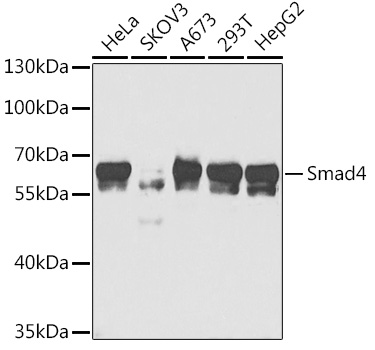
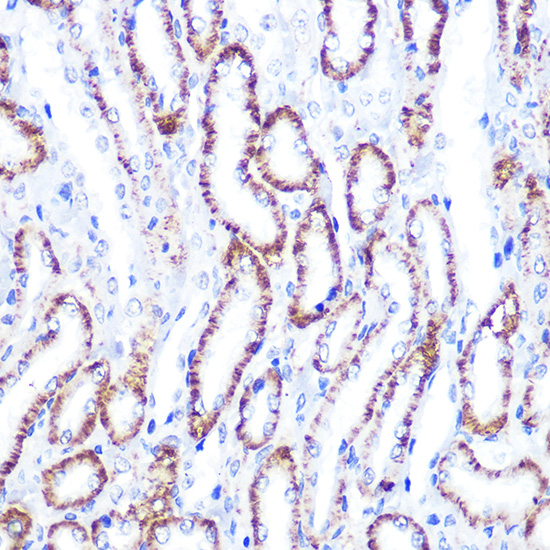
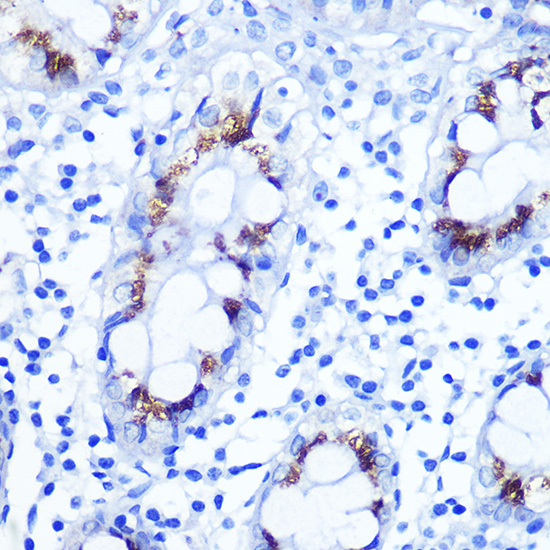
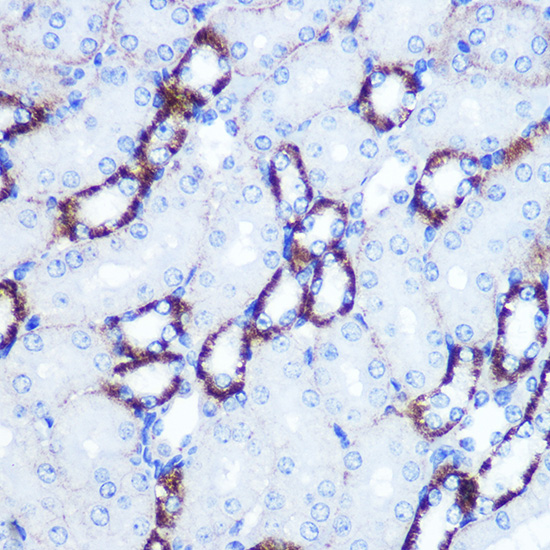
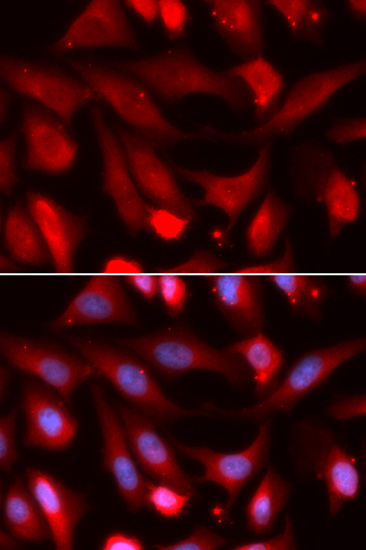
![Anti-Smad4 Antibody [KO Validated] (CAB19116) Anti-Smad4 Antibody [KO Validated] (CAB19116)](https://cdn11.bigcommerce.com/s-rd6ounxcu2/images/stencil/590x590/products/55874/61056/anti-smad4-antibody-ko-validated-cab19116__57259__64025.1706533698.jpg?c=1)
![Anti-Smad4 Antibody (CAB18078)[KO Validated] Anti-Smad4 Antibody (CAB18078)[KO Validated]](https://cdn11.bigcommerce.com/s-rd6ounxcu2/images/stencil/590x590/products/55219/59962/anti-smad4-antibody-cab18078ko-validated__93056__03763.1706529206.jpg?c=1)


![[KD Validated] Smad4 Polyclonal Antibody [KD Validated] Smad4 Polyclonal Antibody](https://cdn11.bigcommerce.com/s-rd6ounxcu2/images/stencil/590x590/products/81901/86690/A21487_1__67708__89158.1706547020.jpg?c=1)